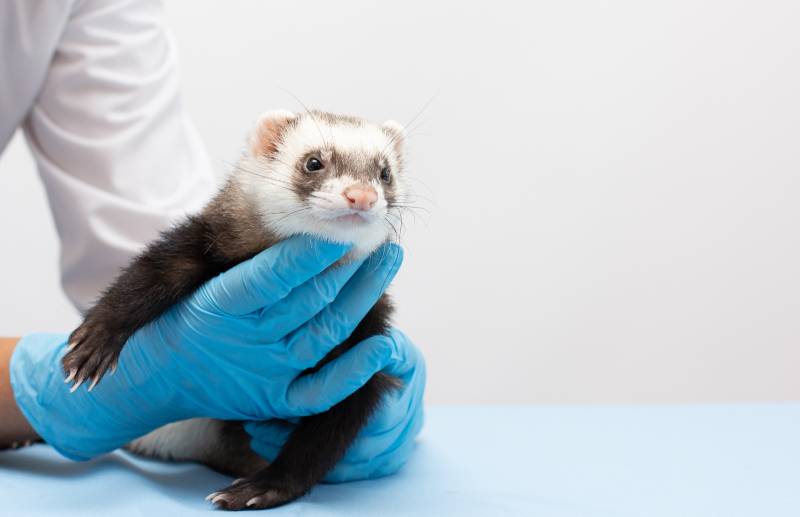How Long Do Ferrets Live? Vet-Reviewed Average Lifespan, Data & Care Guide
By Jordyn Alger
Updated on

Click to Skip Ahead
Ferrets are lively, entertaining animals that can make excellent companions for the right owner. When considering a ferret as a pet, there are several factors to consider, such as their dietary needs, environmental requirements, and health concerns.
One of the more pressing matters to remember is how long you can expect your pet ferret to live. So, how long should you be prepared to care for a pet ferret? Domesticated ferrets are thought to have longer lifespans than their wild counterparts. On average, your pet ferret can live around 7 years. However, their lifespan is assumed to be around 10 years at most.
How Long Do Ferrets Live in the Wild?
It is thought that wild ferrets live a shorter lifespan than their domesticated counterparts. However, no confirmed data exists to confirm that theory. Therefore, at this point, it isn’t possible to provide an estimate of a wild ferret’s lifespan.

How to Care for Your Ferret for a Long Lifespan?
- If you are in the US: Though ferrets are popular pets, it is illegal to own them in certain jurisdictions. Ferrets are illegal in California under the Fish and Game Code Section 2118 and the California Code of Regulations. A similar restriction exists in Puerto Rico. Certain cities in the US, such as Washington, D.C., and New York City, prohibit ferrets. A license might be required to own a ferret in other states. In the US, ferrets are deemed as wild animals under common law, therefore, you might be subject to strict liability for any injuries they cause to other humans or animals. However, in several states, statutory law may overrule common law. You should always check with the United States Department of Agriculture’s Animal Care office in your state to find out whether the laws in your area permit ownership of ferrets.
- If you are not in the US: In certain countries, such as New Zealand and Brazil, ferrets cannot be kept as pets, unless certain conditions are met (such as a microchip and sterilization). In other countries (such as Australia or Japan), you might be required to register your pet depending on where you reside. Always check the latest, relevant laws in your place of residence before deciding to adopt a ferret.
You must attend to their specialized needs to provide your ferret with a long, happy life. These needs include your pet’s food and diet, environment, general care, cleaning, and healthcare.
Feeding & Diet
A healthy diet is a vital part of your pet’s health. Ferrets are carnivores, and they require animal protein in their meals. Therefore, you should search for a food that provides a high protein level and minimal carbohydrates. Ferret-specific diets are the best way to ensure you provide your pet with the nutrition they need.
Environment
Providing a proper environment for your ferret is essential. Ferrets are skilled escape artists, and a durable, high-quality cage is needed to keep your pet inside their enclosure. Cages must be at least 36” L x 36” W to provide your ferret with room to run; likewise, the spaces between the bars of the cages must be small enough to prevent them from slipping out.
Another potential issue is your ferret’s tendency to swallow items too big for their bodies. If your ferret comes across a swallowable object while unsupervised, there is a chance that they will attempt to eat it. This can lead to complications such as choking, intestinal obstruction, and other traumatic injuries. You should also ensure that your ferret cannot climb tall structures in the house since it can put them at risk of suffering injuries from a fall.
Inside your ferret’s cage, it is necessary to provide them with opportunities for mental stimulation. This includes hammocks, ramps, and toys.

Care
Your ferret should have at least 3–4 hours per day that they can spend outside of their cage. During this time, it is essential that you supervise them. As mentioned before, ferrets have a habit of chewing on anything they can get their paws on. This habit can put your pet at high risk of choking or ingesting toxic materials without supervision.
Breeding
Current veterinary consensus is to have all pet ferrets sterilized prior to adoption. They should only be bred by registered breeders who are experienced with the species. Please be mindful that in some countries, it is illegal to own a ferret unless they are sterilized.
The vast majority of ferrets are spayed or neutered before 6 weeks of age. This is primarily because females come into heat when they reach sexual maturity and will remain in heat unless bred. Prolonged periods of heat without being bred can result in health issues, such as anemia.
Male ferrets that have not been neutered have a strong, musky smell when they come into season, which happens twice yearly. They also mark territory by urinating on it.
If your ferret is not spayed or neutered when you adopt them, you should talk to your veterinarian about performing the procedure. All pet ferrets should be spayed or neutered at an appropriate age.

Cleaning
To keep your ferret’s area clean, train them to use a litter box and clean their enclosure frequently. Remove their waste daily and replace soiled bedding. At least once a week, remove the toys and equipment from the cage and clean it thoroughly.
Healthcare
Keeping up on your ferret’s healthcare will significantly impact their longevity. Brush your ferret’s teeth daily to combat the onset of painful periodontal disease. Similarly, be aware of the signs of other serious health conditions, such as adrenal disease, lymphoma, and insulinoma, which are common as ferrets age. Take your ferret to regular vet visits and ensure they are up to date on the necessary vaccinations.
The Life Stages of a Ferret
In their first stage of life, young ferrets are called kits. Kits range from newborns to when they are sexually mature, though they require a seasonal trigger before they mate. Ferrets are considered adults when they are sexually mature, which happens on the first after they’re born.
Ferrets mate between March and September, as the days get longer. Their pregnancy lasts around 42 days. Both male and female ferrets reach sexual maturity in their “first spring”, another name for their mating period. This occurs after the winter, and when they are exposed to around 12 hours of sunlight per day (or more). This means that a female can be as young as four months old when she first comes into heat (if she was conceived late September and born early to mid November).
There is no established consensus on when a ferret is considered a senior or geriatric, though, given their lifespan of around 9 years or so in captivity, a ferret over the age of 7 might be considered a senior. There are, however, unverified claims of certain ferrets living to the age of 12 years and therefore, these guidelines of seniority aren’t considered accurate.
How to Tell Your Ferret’s Age
It can be difficult to tell how old your ferret is just by looking at them. Your vet may determine your pet’s age by examining their dentition. However, without an accurate record of their birth, your vet may not be able to give you an accurate estimate of age. It is important to only adopt ferrets from a reputable breeder who has information on their date of birth and date of vaccination and sterilization.

Conclusion
With proper care, ferrets can live for several years. Before bringing a pet ferret home, ensure you can provide for their dietary, environmental, and other essential care needs. In addition, ensure it is legal to own a ferret where you reside. Taking your pet to the vet regularly and maintaining a healthy environment will help boost the quality and length of their life.
Related Reads:
Featured Image Credit: justart7, Shutterstock













